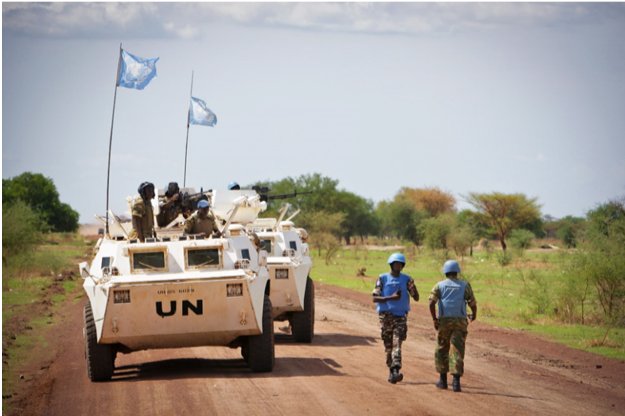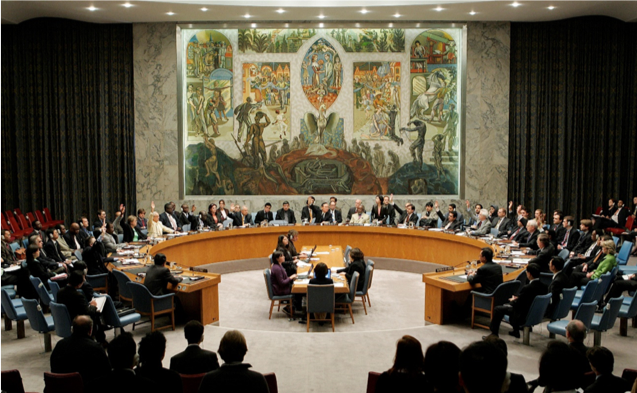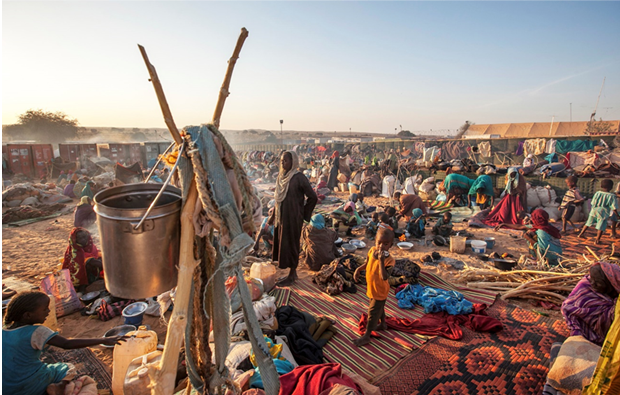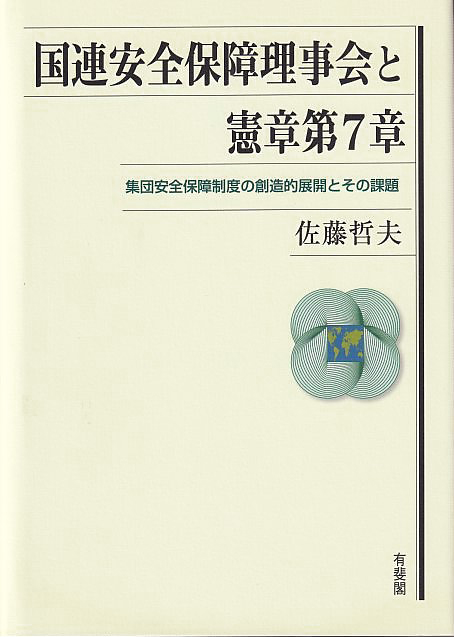佐藤 哲夫(特任教授)
【何が問題か】
国際社会は国々が自らの国益を追求する弱肉強食の世界である一方で、国際社会全体としての共通の利益、「公的利益」が認識されてもいる。地球環境の保護やパンデミックの鎮圧はその象徴的な例である。
国際平和の分野で考えれば、侵略(1990年イラクによるクウェートの侵略と併合)、民族対立によるジェノサイド(1994年ルワンダ)、内戦における人道に対する犯罪(1991年以降の旧ユーゴスラビア)などに始まる、冷戦終結後における大規模で重大な人権侵害や殺戮に対して、国際社会はどのように対応してきたのであろうか。
19世紀までの伝統的国際法秩序は基本的に二国間関係の総和に過ぎなかったが、国際社会の組織化が高度化するにともない、国際社会全体が共同体として認識され、国際共同体の法益としての公的利益の保護が求められるようになり、国際法の下での国家間の権利義務関係にも、従来の水平的な二国間関係に加えて、強行規範(jus cogens)という階層的に上位に位置する公序規範が導入され、侵略やジェノサイドの禁止は強行規範と理解されている。
【Secretary-General Addresses Security Council on Middle East, 20 July 2006】

このような国際社会の公的利益を確保するためには、そのための仕組みや機関が求められる。侵略やジェノサイドの禁止という国際平和の分野において、そのための仕組みの中心には国連憲章第7章に基づく集団安全保障制度があり、その運用機関としては国連安全保障理事会がある。
しかし、大規模で重大な人権侵害や殺戮に対する国連安保理による集団安全保障制度の運用は、国際社会の公的利益を保護する公的機関としてその名に値するものであったのか、不十分だとすれば、その課題は何なのか。
【この問題意識はどのように展開し、どのような研究成果になったのか】
(1) 冷戦終結後、1990年代の侵略、ジェノサイド、人道に対する犯罪の事例に、安保理を中心とする国際社会はどのように対応したのか。まずは、その試行錯誤を、国際法および国連憲章第7章に基づく集団安全保障制度の観点から分析した。
●「(1990年イラクによるクウェートの侵略と併合に対して安保理が採択した)決議678およびそれに基づく多国籍軍の行動の法的性格・根拠をどのように理解するかは困難な問題であり、学説も対立している。例えば、①多国籍軍として結集した諸国の集団的自衛権の行使、②憲章第39条の勧告に基づく行動、③憲章第42条の軍事的措置、④安保理決議678の『許可』は、集団的自衛権としての武力行使とも憲章第42条の『行動』とも両立する、⑤憲章上の根拠を欠く違法な行動、⑥国際連合の内在的権能に基づく限定的ではあるが公的な制裁活動、などが指摘できる。」「国際連合憲章第7章は、国家間の権利義務関係を設定する通常の二国間あるいは多数国間条約と同一の解釈枠組みの下で解釈されるのではなく、組織的な実体の恒久的な運用によってのみ遂行可能な任務に向けられた国際組織の実効的な機能のために発展的かつ目的的に解釈される『組織法としての解釈枠組み』の下で運用されていると考えられる。」
【Security Council Authorizes Deployment of European Union Force During Democratic Republic of Congo Elections, 25 April 2006】

⇒「冷戦後の国際連合憲章第七章に基づく安全保障理事会の活動――武力の行使に関わる二つの事例をめぐって――」一橋大学研究年報『法学研究』第26号、1994年、53-167頁〔→『国連安全保障理事会と憲章第7章』(有斐閣、2015年)に所収〕
(2) 国際組織の役割や必要性そして影響力が増す一方の21世紀においては、国際組織およびその決定の正当性の問題は大きな課題となってきている。1990年代の安保理による武力行使のみならず多様な非軍事的強制措置は、正当性の観点から、どのように評価できるのか。
●「安全保障理事会は、国際連合憲章の全体的展望から見て法的に不明瞭な領域にますます踏み込むようになってきている。法的な文献における正当性概念への言及の増大は、安全保障理事会の様々な活動の合法性が不明確である、あるいはせいぜいのところ脆弱であることを、間接的に指摘していると言えよう。・・・安全保障理事会が法的グレー・ゾーンに踏み込めば踏み込むほど、その活動が実効的であり受け入れられるためには一層大きな正当性が必要とされる。」「国際社会の憲法としての国際連合憲章に照らした安全保障理事会の活動の正当性にとっては、権力の乱用防止と適正な行使の確保を目指した、権力分立および司法審査などの点での一層高い配慮が必要とされる。安全保障理事会の強力な権限が実際に行使されるようになれば、集権的な国内統治組織における権力の乱用防止と適正な行使を確保するための基本的原理である権力分立および司法審査が、適用可能な程度と範囲において、国際連合においても検討される必要があろう。」
⇒「国際連合憲章第七章に基づく安全保障理事会の活動の正当性」一橋大学研究年報『法学研究』第34号、2000年、175-242頁〔→『国連安全保障理事会と憲章第7章』に所収〕
(3) さらに、その後に国際組織の活動や決定(例えば、安保理による非軍事的な強制措置の決定)が国内の私人や企業に対して直接に大きな影響を及ぼすようになってきたことを踏まえて、民主的正当性やアカウンタビリティの観点からの検討が求められる。
●「政策の実質的決定権限が国内レベルから国際レベルに重心を移しつつあり、しかも、国際組織の決定が従来は国内法が規律の対象としてきた私人や企業などに対しても規律を及ぼすようになってきた。さらに国際組織の決定に関しては、一般に各国の立法府による行政府に対するコントロールは不十分になりがちであり、結果的に行政府が大きな影響力を行使している。こうして、一般の国民の眼から見れば、自分たちのコントロールが十分に及ばない国際レベルでの決定の影響に一方的に晒される結果となっており、そのような決定そして国際組織自身の正当性が問われるべきと考えられるのである。国際組織や国際法が影響力や規律対象の点で国内の統治機関や国内法のようになってくれば、後者が服している透明性や説明責任などの正当性確保の要件に、国際組織や国際法も同様に服することが当然に期待されることになろう。」「国際組織における民主主義の赤字や正当性の赤字が正面から議論されるようになっている。しかし、主権独立国家から構成され、主権平等という法的擬制に基づく国際社会では、国際組織のあり方を検討するに際して、国内における民主主義の議論を直輸入することはできない。ここでは、民主主義の中核理念である被治者の同意という視点から、一方で国内レベルにおいては国際組織に参加する行政府に対する立法府の民主的コントロールの強化を、他方で国際組織レベルにおいてはアカウンタビリティ概念に含まれる幾つかの方法や手続の導入を指摘したにとどまる。」
⇒「国際組織およびその決定の正当性――21世紀における国際組織の課題――」『思想』2007.1、No.993、184-202頁
(4) 1994年のルワンダにおけるジェノサイドは、何故防げなかったのか。常設の国連軍の設置は、何故実現しないのか。世界政府論には、何故見通しがないのか。国連平和維持軍は、何故、どのように変容せざるを得ないのか。このような喫緊の課題を分析した。
【UN Peacekeepers on Patrol in Abyei, 30 May 2011】

●「第二次大戦後に多くの人々を動員した実践運動として展開した『世界政府論』は、広島と長崎の経験に突き動かされ、核兵器による人類破滅の差し迫った危険に対応する解決策として主張された。(しかし)政府の成立のために必要な社会的条件の成熟が、国際社会には欠けている・・・。」「政府というものだけによって共同社会を作り出すことはできない。政府の権威は、もともと法や権力に基づくものではなく、共同社会そのものの権威によるものであって、法律が遵守されるのは、社会がそれを全般的に見て正義の理念に合致していると考え承認するからである。もちろん、法律や権力が社会を組織化し、その統一を維持する上で、ある程度の効果を持っていることは否定できない。しかし、法律や権力だけで社会を統一しようとすれば、結局、政府の圧倒的に優越した権力を前提しなければならず、世界政府は必然的に圧制的なものとならざるをえないであろう・・・。」「国連常設軍に期待される機能や求められる性質を踏まえて、その構成要素として少なくとも次の3点、①軍事的強制能力、②迅速展開能力、③国際社会の公的機関または公的機能としての正当性を指摘できよう。」「しかし基本的な問題として、常設の国連軍設立の試み、常設どころか待機軍の設立の試みがほとんど失敗してきたのは何故か、を押さえる必要がある。そしてこの点で根本には、すべての国々は、そして多くの人々は自国の主観的な国益を重視し、軍事力を行使する自らの権限を国連に委譲することに躊躇する、特に自国の明示の同意や指揮なくして遠くの危険な軍事活動に自国の軍隊が参加することを事前に約束することには慎重である、という実情がある。」
⇒「見果てぬ夢、国連常設軍――国際公共目的に向けた軍事的強制の現代的諸相――」『世界法年報』第30号、2011年、1-51頁〔→『国連安全保障理事会と憲章第7章』に所収〕
(5) 国際組織の活動や決定の結果として、特定の私人が被害を被った場合、特に人権が侵害されたと考えられる場合には法的責任が確認され、被害者の救済がなされるのが望ましい。適用法規の明確化は、法的責任制度の適用の前提である。ところが、これらの点は、従来、必ずしも明らかではなかった。国際組織はどのような法に拘束されるのか、特に人権規範に拘束されるのか、という問題から、平和(維持)活動・安保理制裁・暫定行政活動・開発援助の各領域における人道法規範・人権規範等の適用可能性などの検討が求められる。
●「As international organizations and international law frequently function in the same manner as domestic governing bodies and domestic law in terms of their influence on private persons and companies, international organizations and their decisions are increasingly demanded to satisfy the same requirements for legitimacy, such as transparency and accountability, that the latter are subject to. This logic would apply to human rights law, and promote the applicability of human rights law to Security Council activities. Thus, we might be witnessing a Copernican revolution of international law as indicated by the changing basis of legally binding human rights law: moving from “based upon traditional sources of international law” to simply “applicable to any exercise of governmental powers and functions by whatever entity influencing private persons.”」
⇒「Transitional Justice, Peacebuilding, and International Law: What Role is Played by the UN in Post-conflict Peacebuilding?」『国際法外交雑誌』第110巻第4号、2012年、26-58頁
(6) このような問題への対応として、国際社会における「公」の概念に着目して国際連合や専門機関が国際社会における公的利益を保護促進する公的機関としての位置づけと機能を有するとの問題意識から、公的権力としての規制のあり方の研究に取り組んできた。
●「19世紀までの国際社会では、国際法関係は二国間関係の集まりであり、公権力の名に値する実体は存在していなかった。しかし、20世紀始めの国際連盟の成立とともに、分権的水平的な国際法秩序が組織化の時代に入り、戦争の禁止への動きが始まり、集団的安全保障制度が連盟により導入された。第二次世界大戦後には、国際連合と専門機関などの普遍性を指向する政府間国際組織が国際社会を代表する機関として、国際社会の枠組み・骨組みとして機能し、国際社会の共通利益の担い手としての地位を確立した。国際社会に公権力の要素を見いだしうるとするならば、国際連合をおいてあるまい。」
⇒「第9章 国際紛争と公権力:国連安全保障理事会」(山内進他編『暴力:比較文明史的考察』東京大学出版会、2005年)235-264、308-310、314-317頁〔→『国連安全保障理事会と憲章第7章』に所収〕
【Security Council Condemns Nuclear Test by Democratic People's Republic of Korea, 14 October 2006】

●「国連安全保障理事会を国際社会の公権力として位置づけることは、安保理という機関およびその担う集団安全保障制度が、個別国家や国家集団などとは異なる、国際社会の公的な機関であり、公的な秩序を維持するための制度であることを象徴的に示す。そこにおいて保護の対象とされる利益が、個別国家の私的な利益ではなくて、国際社会全体の公的利益であり、国際社会の秩序破壊行為に対して発動されるのが、公権力であることを象徴的に示すことになる。」「確かに、『公』の概念は常に一義的に定まるものではなく、多かれ少なかれ私的な利益が入り込み、一部の私的利益を『公』の名の下に正当化するというイデオロギーとして機能する側面があることも事実である。しかし、『公』の概念の使用の当否は、『国際公益の事実性』と『国際公益のイデオロギー性』のバランスに基づいて判断する必要がある。国際社会の組織化が進展し、グローバリゼーションの下で国際社会の法構造も人間価値中心的な変容を遂げつつある段階においては、『公』の概念のイデオロギー的機能の危険性を十分に認識した上ではあるが、国際連合や安保理などの普遍的国際組織や集団安全保障制度などを、公的な組織や制度であり公権力として捉える見方が有益になってきていると考えられる。」
⇒「第10章 公権力としての安全保障理事会の課題」『国連安全保障理事会と憲章第7章』362-385頁
【New IDP Arrivals at Um Baru, North Darfur, 26 January 2015】

●「アフリカの現地の状況を見てみれば、何万人、何十万人という人達が大規模な難民だとかあるいは場合によってはジェノサイド的な状況に置かれているではないか、それを見捨てていいのか・・・。でも、自分の息子だとか夫がそこに派遣されて、それは日本の国益に直結するかと言われると間接的には関わるけれど、直結するとまでは必ずしも言えないという場合にどうするかという話です。」
⇒「講演:国際公益と国連安全保障理事会」『法政論叢(山形大学)』68・69号、2018年、109-148頁
【現在、取り組んでいる問題は何か】
第1に、以上の研究成果が示すように、国連安保理による集団安全保障制度の運用の問題や課題を、公的権力としての規制のあり方という観点から検討する研究を継続している。

しかし第2に、国際社会における公的利益の保護促進の担い手としては、国際組織以外にも市民社会を代表する民間団体(Non-Governmental Organizations:NGOs)や多国籍企業などの役割も大きくなってきていることを踏まえて、普遍的国際組織と共にNGOsなどの非国家アクターが国際社会の公的利益を保護促進する公的機関としての位置づけと機能を有するのであれば、適切な規制の対象としても扱われるべきであり、それらの活動を規律する手続的および実体的な原則と規則およびそれらの実施の仕組みを研究することを考えている。
国際公益実現の担い手としての普遍的国際組織(上記の第1に挙げた安保理はその一例)や条約レジームは、現在、正当性、アカウンタビリティ、人権遵守、外部機関による合法性審査の仕組みの導入などを求められ、かつてない重要かつ構造的な変革過程にある。それに加えて、従来、国際法上の権利義務の帰属する法的主体とは見なされてきていないNGOsや多国籍企業などの非国家アクターについても、その活動がグローバル化の下で影響力を増してきた結果、それらのアカウンタビリティ確保や人権遵守義務が問題とされている。
このように、国際社会における公的利益の保護促進の担い手としての普遍的国際組織、条約レジーム、NGOsや多国籍企業などの非国家アクターは、それらの活動がグローバル化の下で影響力を増してきた結果、共通して、アカウンタビリティ確保や人権遵守義務が求められている。伝統的な国際法秩序は、国家中心主義的な仕組みの結果、このような非国家アクターの規律に十分に対応できていない。これらの非国家アクターが国際公益機関としての権限や機能を担い、それらの活動が「統治的規制的な権限・機能の行使」に踏み込む場合を取り上げて、公的権力としての規制のあり方という観点から、当該活動を規律する(すべき)手続的および実体的な原則と規則およびそれらの実施の仕組みを解明することを目的とする。
●「国際組織の存在と活動による国際社会の組織化は、必然的に国際法秩序の変容をもたらしている。具体的には、国際社会の国際共同体化に基づく国際法秩序の規範構造の変容であり、グローバル化の進展に伴う非国家アクターの影響力拡大に対する国際法秩序の対応としての非国家アクター(特にNGOs)の影響力の取り込みであり、国際法の伝統的な成立形式である条約と慣習国際法を補完するものとしてのソフトローおよびその遵守に関わる制度の展開である。」
⇒「グローバル化する国際社会における国際法秩序と非国家アクター――国際法協会での取組経験を主な素材として――」(岩沢雄司・岡野正敬編集代表『国際関係と法の支配 小和田恆国際司法裁判所裁判官退任記念』信山社、2021年)779-815頁
Protecting and promoting public interests in the international community and the UN Security Council
SATO, Tetsuo (Specially Appointed Professor)
【What are the problems I am interested in?】
While the international society is a world of survival of the fittest where countries pursue their own national interests, the common interests of the entire international society, “public interests,” are also recognized. The protection of the global environment and the suppression of pandemics are primary examples.
In the field of international peace, the end of the Cold War was followed by aggression (the invasion and annexation of Kuwait by Iraq in 1990), genocide due to an ethnic conflict (Rwanda in 1994), and crimes against humanity in a civil war (former Yugoslavia since 1991). How did the international society respond to the subsequent large-scale and serious human rights abuses and slaughters?
The traditional international legal order up to the 19th century was basically just the sum of bilateral relations, but with the sophistication of the organized international society, the entire international society was recognized as a community with its own legal interests to be protected. As a result, in addition to the conventional horizontal bilateral relations under international law, peremptory norms, norms of public order situated hierarchically above traditional ordinary norms, have been introduced, and prohibitions of aggression and genocide are understood to be peremptory norms.
In order to secure such public interests of the international community, mechanisms and institutions for that purpose are required. In the field of international peace such as prohibitions of aggression and genocide, the collective security system based on Chapter VII of the UN Charter is the primary mechanism for that purpose and the UN Security Council is its operating body.
However, the UN Security Council's operation of the collective security system against large-scale and serious human rights abuses and slaughters, did it deserve its name as a public institution that protects the public interests of the international community? If not, what are the problems?
【How did this awareness of problems develop and what kind of research outcomes came out?】
(1) Since the end of the Cold War, how did the international community centered on the Security Council respond to the cases of invasion, genocide, and crimes against humanity in the 1990s? First, I analyzed the trials and errors from the perspectives of international law and the collective security system based on Chapter VII of the UN Charter.
● “The legal nature and basis of the actions of multinational forces based on Resolution 678 (adopted by the Security Council against the invasion and annexation of Kuwait by Iraq in 1990) posed a difficult question, and conflicting doctrines were presented. For example: (1) exercise of the right of collective self-defense by those countries joining the multinational forces, (2) actions based on the recommendations of Article 39 of the Charter, (3) military measures of Article 42 of the Charter, (4) ‘authorization’ of Security Council Resolution 678 compatible with both the use of force as a right of self-defense and the ‘action’ of Article 42 of the Charter, (5) illegal behavior that lacks legal grounds in the Charter, and (6) limited but public sanction based on the inherent powers of the United Nations , could be pointed out.”
“Chapter VII of the Charter of the United Nations is not to be construed under the same interpretative framework as the usual bilateral or multilateral treaties that establish the rights and obligations of states, but is rather considered to be operated under the ‘interpretative framework as constitution’, which dictates a progressive and purposeful way of interpretation for the effective functioning of international organizations to carry out tasks that can only be performed by those organizations.”
⇒“Evolving Activities of the Security Council under Chapter VII of the United Nations Charter: with regard to two issues relating to the use of force”(in Japanese), Hitotsubashi University research series. law and politics, Vol. 26, 1994: pp. 53-167 [→ Included in The Security Council of the United Nations and Chapter VII of the UN Charter (Yuhikaku, 2015, in Japanese)].
(2) In the 21st century, when the role, need and influence of international organizations keep increasing, the problem of legitimacy of international organizations and their decisions has become a major issue. From the perspective of legitimacy, how can various non-military enforcement measures as well as the use of force by the Security Council in the 1990s be evaluated?
● “[T]he Security Council has increasingly stepped into legally grey areas from the perspective of the UN Charter. Increasing references to the concept of legitimacy in legal literature would be a clear indication that the legality or constitutionality of various activities by the Security Council is ambiguous or fragile at best…. [T]he more the Security Council steps into legally grey areas, the more legitimacy is required for its activities to be effective and acceptable….”
“Legitimisation of Security Council activities in the light of the UN Charter as the Constitution of the International Community needs a higher degree of support in terms of separation of powers and judicial review which aim at preventing abuse of and ensuring proper exercise of powers. As the Security Council has more occasions to exercise its strong powers, we need to examine whether, and if so, to what extent, separation of powers and judicial review as fundamental mechanisms for preventing abuse of and ensuring proper exercise of powers in centralised national governing systems can be applied to the United Nations system.”
⇒ “The Legitimacy of Security Council Activities under Chapter VII of the UN Charter since the End of the Cold War,” in The Legitimacy of International Organizations (Jean-Marc Coicaud and Veijo Heiskanen eds., UNU Press, 2001): pp. 309-352.
(3) Moreover, since the activities and decisions of international organizations (for example, decisions by the Security Council on non-military enforcement measures) have had a direct impact on domestic private individuals and companies, consideration from the viewpoint of democratic justification and accountability will be required.
● “[T]he main focus of the substantial decision-making powers on policies is shifting from the domestic to the international level, while the decisions of international organizations are also having more influence on private persons and companies which have traditionally been regulated by domestic law. Moreover, while member states are represented by their governments (executive bodies) in international organizations, domestic legislative bodies generally lack enough influence on domestic executive bodies in these matters, and, as a result, executive bodies are in a position to exert more influence over the decisions of international organizations. Thus, from the viewpoint of the general public who are subject to the unilateral impact of decisions made at an international level over which they are allowed no significant input, it is pertinent to question not only the legitimacy of the decisions made by international organizations, but even the legitimacy of the organizations themselves. As international organizations and international law function in the same manner as domestic governing bodies and domestic law in terms of their influence on private persons and companies, we must also necessarily demand that international organizations and international law satisfy the same requirements for legitimacy, such as transparency and accountability that the latter are subject to.”
“[T]he democracy deficit and legitimacy deficit of international organizations are seriously being argued at present for the first time. However, in the international society consisting of sovereign independent states and based on the principle of legal fiction, sovereign equality, we cannot directly import arguments on democracy in the domestic context into the discussion on how international organizations are to be organized.... I have only attempted, from the perspective of the “consent of the governed” as the core principle of democracy, to point out, at the domestic level, some ways to reinforce the democratic control by the legislative body over the executive body which participates in international organizations, and, at the level of international organizations, a few methods and procedures included in the concept of accountability.”
⇒ “Legitimacy of International Organizations and their Decisions - Challenges that International Organizations Face in the 21st Century,” Hitotsubashi Journal of Law and Politics, Vol. 37, 2009: pp. 11-30.
(4) Why could a genocide in Rwanda in 1994 not be prevented? Why can the United Nations Standing Force not be established? Why can World Government Theory not present a desirable model of world governance? Why and how do the United Nations Peacekeeping Forces have to change? I have analyzed such pressing issues.
● “The World Government theory, which was developed as a practical movement that mobilized many people after World War II, was urged by the experiences of Hiroshima and Nagasaki, and was argued as a solution to the imminent danger of human destruction by nuclear weapons. (However,) the international society lacks the maturity of social conditions necessary to establish a government. A government cannot create a society alone. The authority of the government is not based on the law or power in the first place, but on the authority of the communal society itself. Law is observed because society considers that it is generally consonant with the ideal of justice and approves it. Of course, it cannot be denied that laws and powers have some effect in organizing society and maintaining its unity. However, if we try to unify society by law and power alone, we must assume in the end the overwhelming power of the government, and the world government will inevitably become oppressive.”
“Based on the expected functions and required properties of the United Nations Standing Force, at least the following three points are considered as its components: (1) military enforcement capability, (2) rapid deployment capability, and (3) legitimacy as a public organization or function of the international community.”
“However, as a fundamental problem, it is necessary to realize why attempts to establish the United Nations Standing Force, and even attempts to establish a standby force have failed. There is a fact, in this respect, that all nations as well as many people place emphasis on their own subjective national interests, are hesitant to delegate their power to exercise military force to the United Nations, and are especially reluctant to promise in advance that their troops will participate in dangerous and distant military operations without their own consent and direction.”
⇒ “A UN Standing Force, An Impossible Dream? ― Contemporary Military Enforcement Measures for International Public Functions ―” (in Japanese), Yearbook of World Law, No. 30, 2011: pp. 1-51 [→ Included in The Security Council of the United Nations and Chapter VII of the UN Charter].
(5) If a particular private person is injured, especially if human rights are considered to be infringed as a result of the activities and decisions of international organizations, legal liability should be confirmed and victims should be relieved. Clarification of applicable law is a prerequisite for the application of the legal liability system. However, these points have not always been clear in the past. From the viewpoint of what kind of laws international organizations are bound by, the applicability of humanitarian norms and human rights norms needs to be examined in such fields as peace (keeping) operations, Security Council sanctions, transitional administration and development assistance.
● “As international organizations and international law frequently function in the same manner as domestic governing bodies and domestic law in terms of their influence on private persons and companies, international organizations and their decisions are increasingly demanded to satisfy the same requirements for legitimacy, such as transparency and accountability that the latter are subject to. This logic would apply to human rights law, and promote the applicability of human rights law to Security Council activities. Thus, we might be witnessing a Copernican revolution of international law as indicated by the changing basis of legally binding human rights law: moving from ‘based upon traditional sources of international law’ to simply ‘applicable to any exercise of governmental powers and functions by whatever entity influencing private persons.’”
⇒ “Transitional Justice, Peacebuilding, and International Law: What Role is Played by the UN in Post-conflict Peacebuilding?” The Journal of International Law and Diplomacy, Vol. 110, No. 4, 2012: pp. 26-58.
(6) As a response to such problems, I have focused on the concept of “public” in the international community with the understanding that the United Nations and Specialized Agencies have the positions and functions as public institutions that protect and promote public interests in the international community, and have been doing research from the viewpoint of how public powers should be regulated.
● “In the international society up to the 19th century, international legal relations were a group of bilateral relations, and there was no entity worthy of the name of public authority. However, with the formation of the League of Nations at the beginning of the 20th century, the decentralized horizontal international legal order entered the era of organization, the movement to ban war began, and the collective security system was introduced by the League. After World War II, the United Nations and specialized agencies and other international organizations that are oriented towards universality have worked both as the framework of the international society and as organizations representing the international society, and established themselves as bearers of common interests of the international society. If it is possible to find an element of public power in the international society, then there is no better candidate than the United Nations.”
⇒ “Chapter 9 International Conflict and Public Power: United Nations Security Council” (in Japanese), in A Comparative History of the Civilizations of Violence (Susumu Yamauchi et al. eds., University of Tokyo Press, 2005): pp. 235-264 [→ Included in The Security Council of the United Nations and Chapter VII of the UN Charter].
● “Positioning the United Nations Security Council as a public authority of the international community symbolically shows that the organ called the Security Council operating the collective security system is different from individual nations and groups, and a public organ in charge of maintaining public order of the international community. It also symbolically shows that the interests to be protected there are not the private interests of individual states, but the public interests of the international community as a whole, and that it is the public power that is exercised against disruptive acts in the international community.”
“Certainly, the concept of “public” is not always unambiguous. It is also true that it sometimes serves as an ideology justifying some private interests in the name of “public.” However, propriety of using the concept of “public” needs to be judged by the balance between “factuality of international public interest” and “ideologicalness of international public interest”. At the stage where the organization of the international community has progressed and the legal structure of the international community is undergoing human-centered transformation under globalization, it is becoming more useful to grasp universal international organizations such as the United Nations and the Security Council and the collective security system as public institutions and system while acknowledging the danger of an ideological function of the concept of ‘public.’”
⇒ “Chapter 10: Issues of the Security Council as Public Power” (in Japanese), in The Security Council of the United Nations and Chapter VII of the UN Charter: pp. 362-385.
● “If you look at the local situation in Africa, tens of thousands, hundreds of thousands of people are in large scale refugee or even genocide situations. Do you abandon that? However, what do you do if your son or husband is to be dispatched there and it is not necessarily directly connected to Japan's national interest?”
⇒ “Lecture Transcript: Public Interests of the International Community and the UN Security Council” (in Japanese), The Journal of Law and Politics (Yamagata University), No. 68・69, 2018: pp. 109-148.
【What am I currently working on?】
First, as shown by the above research results, I am continuing research on the problems and issues of the collective security system by the United Nations Security Council from the viewpoint of how public powers should be regulated.
Secondly, non-governmental organizations (NGOs) and multinational corporations are also playing important roles in promoting public interests in the international community. To the extent that non-state actors such as NGOs as well as universal international organizations have the positions and functions as public institutions that protect and promote the public interests of the international community, they should be appropriately regulated. Consideration of the procedural and substantive principles and rules that govern those activities and the mechanisms of their implementation will be required.
Universal international organizations (such as the Security Council, mentioned in the first above) and treaty regimes as actors in the realization of international public interests are currently requested to secure more legitimacy, accountability and human rights compliance, and introduce a legality examination system by external institutions. They are in an unprecedented, important and structural transformation process. In addition, the activities of non-state actors such as NGOs and multinational corporations, which have not been traditionally regarded as legal subjects to which rights and obligations belong under international law, are also increasing their influence under globalization. As a result, ensuring their accountability and human rights compliance is becoming an issue.
In this way, non-state actors such as universal international organizations, treaty regimes, NGOs and multinational corporations who are responsible for promoting public interests in the international community, have become more influential in their activities under globalization. As a result, there is a common demand for their accountability and human rights compliance. The traditional international legal order has not adequately regulated non-state actors as a result of state-centric mechanisms. I plan to focus on those cases where these non-state actors carry the authority and functions as international public interest organizations and go into “exercising their governmental and regulatory powers and functions,” and to clarify the procedural and substantive principles and rules that (should) govern such activities and the mechanisms for their implementation from the viewpoint of how public powers should be regulated.
● “The organization of the international community through the existence and activities of international organizations has inevitably brought about transformation of the international legal order. Specifically, it includes (i) transformation of the normative structure of the international legal order based on the evolution of the international society into community, (ii) incorporation of the influence of Non-State Actors (especially NGOs) as a response to the expansion of their influence with the progress of globalization, and (iii) development of soft law and its compliance system as a complement to treaties and customary international law, which are the traditional forms of international law.”
⇒“International Legal Order and Non-State Actors in the Globalized International Society: An Analysis of a Work Experience at the International Law Association” (in Japanese), in International Relations and the Rule of Law: Festschrift for Judge Owada Hisashi in commemoration of his retirement from the International Court of Justice (Iwasawa Yuji and Okano Masataka eds., Shinzansha Publisher Co., Ltd, 2021): pp. 779-815.
